|
|
|
Sort Order |
|
|
|
Items / Page
|
|
|
|
|
|
|
| Srl | Item |
| 1 |
ID:
112169
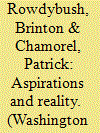

|
|
|
| 2 |
ID:
121440
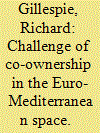

|
|
|
|
|
| Publication |
2013.
|
| Summary/Abstract |
The European Union's recent experimentation with forms of partnership and co-ownership has found its most ambitious expression in its southern neighbourhood in the form of the Union for the Mediterranean (UfM). Initially pioneered by Nicolas Sarkozy in an attempt to reaffirm a leading role for France within Europe, the experiment has foundered on the difficulty of creating effective governance structures in a Euro-Mediterranean space noted for geopolitical complexity, uncertain and shifting boundaries and cultural hybridity. The UfM experience illustrates how region-building can regress when its focus area becomes too extended and overambitious or inappropriate forms of institutionalisation are attempted. Yet, once offered to partners, co-ownership may be difficult to retreat from. The EU has side-stepped the UfM in its initial response to the Arab Spring, but the latter itself may bring southern demands for more effective co-ownership in future regional cooperation frameworks.
|
|
|
|
|
|
|
|
|
|
|
|
|
|
|
|
| 3 |
ID:
097103
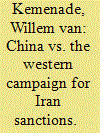

|
|
|
|
|
| Publication |
2010.
|
| Summary/Abstract |
The EU, Israel, and United States have been conducting an intensive campaign of diplomatic skirmishes with Brazil, China, Turkey, and others over imposing sanctions on Iran to stop it from moving from enriching uranium to building nuclear weapons. The sanctions needed to be "crippling" according to U.S. Secretary of State Hillary Rodham Clinton, "massive" according to President Nicolas Sarkozy of France, and "biting" according to Prime Minister Benjamin Netanyahu of Israel.1 Yet, an operational consensus had not been obtained by May 2010. Some in the United States, particularly within Congress, appear willing to be indiscriminate in hitting not only the core of the Iranian regime but also the Iranian people, while Israel is defiantly planning a potentially catastrophic military attack on Iran's nuclear sites even without the consent of the United States.2 On the other hand, Europeans want to be more circumspect and focus on targeting the hard core of Iran's regime rather than its public.
|
|
|
|
|
|
|
|
|
|
|
|
|
|
|
|
| 4 |
ID:
093948
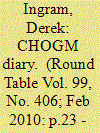

|
|
|
| 5 |
ID:
113174
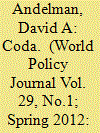

|
|
|
|
|
| Publication |
2012.
|
| Summary/Abstract |
PARIS-We are eight at a long, leisurely lunch in the charming 14th arrondissement apartment just off the Place Denfert-Rocherot. Our host is a Le Monde journalist whose long career has taken him from Cambodia in the last days of the Indochina wars and the killing fields of the Khmer Rouge to John Major's London and to Washington, straddling Clinton and Bush. The afternoon begins with a fabulous hard yellow cheese and a rich white wine from Catalonia down by the Pyrenees separating France from Spain where our hosts have their country cabin. The dishes are passed around, the wine glasses filled and refilled, the main course, a succulent cassoulet de canard and all the trimmings. But the centerpiece, as is the case these days when any two or more Europeans gather, is the Presidentielles-the national elections for the first new President de la Republique in five years. The first round will be held in just 11 weeks. This watershed vote comes amidst another downward spiral in a French economy already battered by the three-year global recession. These two all but inseparable subjects, fused into a complexity only the French can master, continue to mesmerize this nation that, even in the best of times, never takes its politics in stride.
|
|
|
|
|
|
|
|
|
|
|
|
|
|
|
|
| 6 |
ID:
120453


|
|
|
|
|
| Publication |
2013.
|
| Summary/Abstract |
This article seeks to explain the decisions by Nicolas Sarkozy's France and David Cameron's Britain to intervene in the 2011 Libyan crisis. None of the three major theories of international relations-constructivism, defensive realism and liberalism-can explain on its own such intervention decisions as the Libya case. The article's novel analytical model proposes that each theory emphasizes factors and mechanisms that explain part of the decision-making process and that these factors interact with state behaviour in complex ways. Britain and France initially began to consider intervention because they felt that the emergent norm of the 'responsibility to protect' applied to the Libyan case and because they believed the massive flows of refugees fleeing the violence were a threat to their border security. Both countries believed military intervention could be successful at relatively low cost and that if they did not intervene the problem would not be solved. At that point, the Sarkozy and Cameron governments engaged in initial action that made them more likely to intervene by jeopardizing their future economic relations with the Gaddafi regime and making him more likely to threaten them with future terrorist attacks. Taking initial action also meant that French and British prestige would ultimately have suffered had they not intervened to achieve a satisfactory solution to the crisis. Paris and London viewed international and regional support as a critical prerequisite for intervention and they sought and attained it. Finally, the Sarkozy and Cameron governments were able to minimize any domestic political risk of intervening because they had public and/or opposition party support.
|
|
|
|
|
|
|
|
|
|
|
|
|
|
|
|
| 7 |
ID:
119879
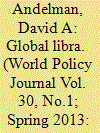

|
|
|
|
|
| Publication |
2013.
|
| Summary/Abstract |
Paris-As a New Year's gift to those who elected him, France's new president, François Hollande, mired in a seemingly intractable economic malaise and about to embark on a war in an old colonial territory of Francophone Africa, made an announcement, which the French daily Le Monde carried as an urgent bulletin. He would put an end to the practice of every ex-president becoming a member of the Conseil Constitutionnel, the final judicial appeal of French citizens. Beginning with himself, though not extending to his hated predecessor, Nicolas Sarkozy, no exiting president would have the inalienable right to a seat on France's highest court. It was a campaign promise, one of 60 that Hollande made, as French presidents are wont to make in the heat of battle but rarely expected to remember, let alone keep. But Hollande has been quite meticulous in honoring a number of them. Still, of the 60 pledges, only two had anything to do with France's hidebound judiciary that has changed little since the Napoleonic Code was established not long after the absolute monarchy was ended by the French Revolution. Even today, in a French court, a defendant who arrives there has already been judged by a juge d'instruction, who is both investigator and judge, and must prove his or her innocence. And while one of Hollande's pledges calls for "suppression of peines-plancher," or unyielding minimum sentences, even this still awaits legislative action.
|
|
|
|
|
|
|
|
|
|
|
|
|
|
|
|
| 8 |
ID:
123243
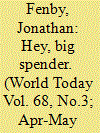

|
|
|
| 9 |
ID:
131864
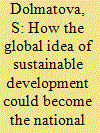

|
|
|
|
|
| Publication |
2014.
|
| Summary/Abstract |
HALF A DECADE has passed since the beginning of the global financial and economic recession in 2008. In this period, significant events have taken place and important trends have emerged, making it possible to review the preliminary results. This is being done not only by researchers and experts, but also at high-level social and political forums.
|
|
|
|
|
|
|
|
|
|
|
|
|
|
|
|
| 10 |
ID:
102013
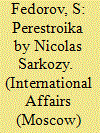

|
|
|
|
|
| Publication |
2010.
|
| Summary/Abstract |
THREE YEARS out of five at the helm is not enough to sum up yet three years of Nicolas Sarkozy have stirred up the public and the analytical community enough to justify a summary. Why?
|
|
|
|
|
|
|
|
|
|
|
|
|
|
|
|
| 11 |
ID:
118063
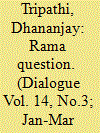

|
|
|
| 12 |
ID:
127023
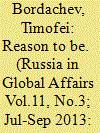

|
|
|
|
|
| Publication |
2013.
|
| Summary/Abstract |
One day in 2009, when France, headed by Nicolas Sarkozy, was completing formalities for rejoining the integrated military command of NATO, the newspaper Liberation published a cartoon depicting the ghost of General de Gaulle, who during his rule had seriously reduced the country's participation in the Alliance. The ghost was hanging over the Sarkozy-Bruni couple, hunched in a corner of their bed, and commanded: "And now, my son, conquer Algeria back!" The joke proved to be prophetic, considering NATO's military operation against Libya in 2011, in the organization of which the Elysee Palace took the most active part of all the allies.
|
|
|
|
|
|
|
|
|
|
|
|
|
|
|
|
| 13 |
ID:
091962
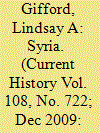

|
|
|
|
|
| Publication |
2009.
|
| Summary/Abstract |
Lately, Syrian President Bashar al-Assad has been strikingly busy. Hosting world leaders in Damascus and embarking on high-profile trips abroad, he has returned Syria to the international news and reminded global power brokers of his country's strategic role in the Middle East.
|
|
|
|
|
|
|
|
|
|
|
|
|
|
|
|
| 14 |
ID:
109520
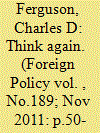

|
|
|
| 15 |
ID:
109522
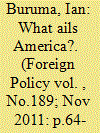

|
|
|
| 16 |
ID:
106711
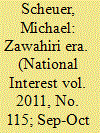

|
|
|
|
|
| Publication |
2011.
|
| Summary/Abstract |
ON MAY 2, 2011, al-Qaeda chief Osama bin Laden left this world for the next, and the American bipartisan political elite-not to mention the U.S.-Euro war-loving quintet made up of Senators John McCain, Joe Lieberman and Lindsey Graham, UK prime minister David Cameron and French president Nicolas Sarkozy-leapt off the precipice of simple unreality into the rarefied environs of true fantasy. They are behaving as if bin Laden's death has ushered in an era in which the United States and the West will at long last get their way in the Muslim world through diktat backed by military force, which, of course, amounts to making our little Muslim brothers just like us . . . Au contraire.
|
|
|
|
|
|
|
|
|
|
|
|
|
|
|
|
|
|
|
|
|